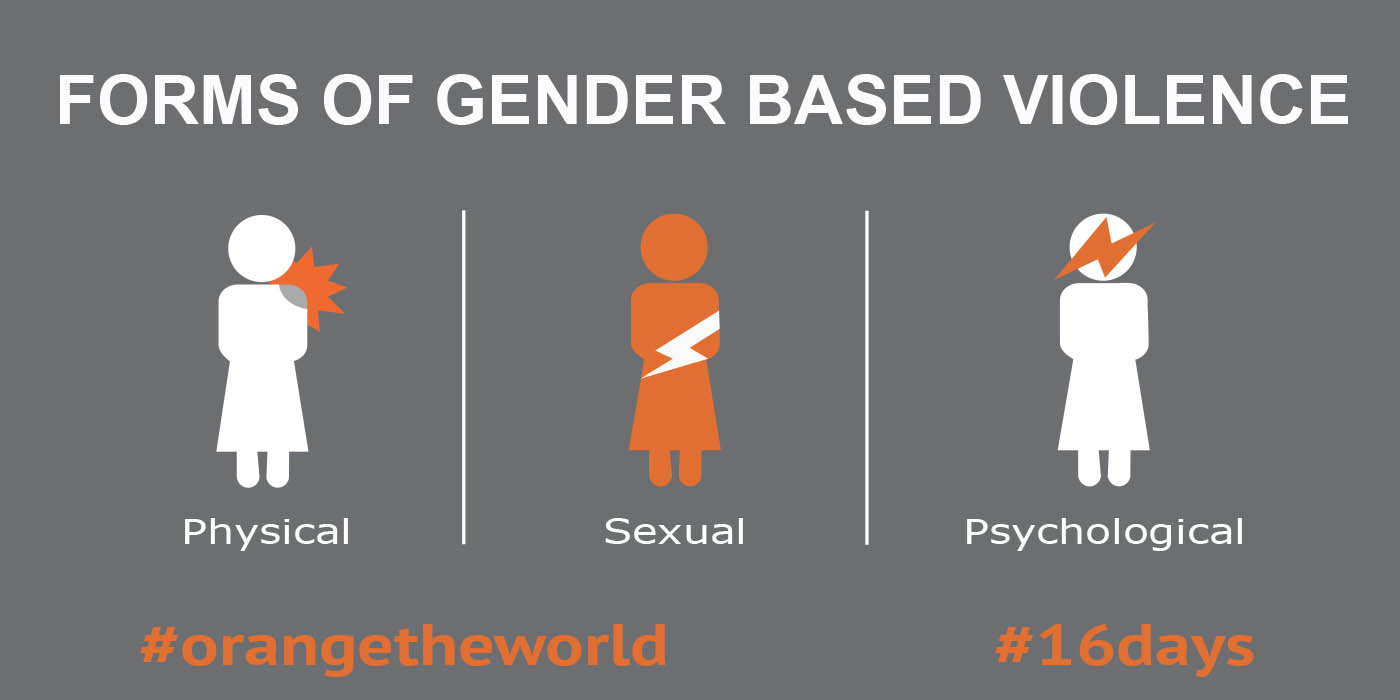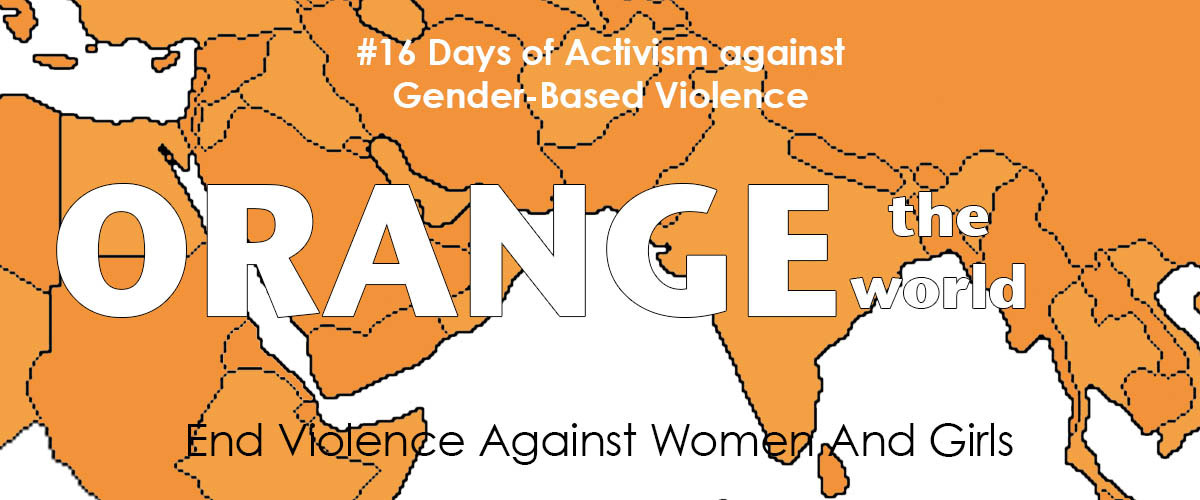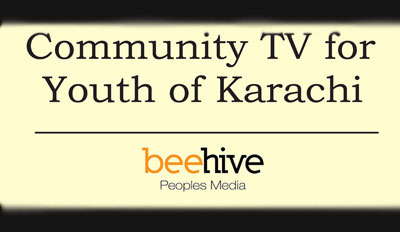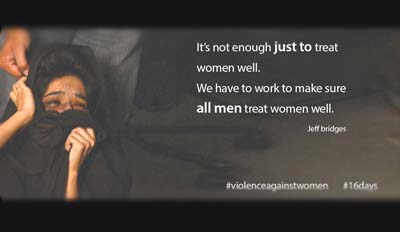Leashing the Kraken of GBV
By Khazima Munaf and Umema Babar
"Violence against women and girls is a human rights violation, public health pandemic and serious obstacle to sustainable development. It imposes large-scale costs on families, communities and economies. The world cannot afford to pay this price."
— Ban Ki-moon, UN Secretary-General
There are constitutions, Universal HR declaration, and an abundance of papers signed by many to turn a protection bill into a law, all trying to ensure women across the world that they have the right to live a life free of violence. Yet millions of women and young girls suffer unreasonably from violence both in peace and in war, at the hands of the state, in the home and community. Across the globe, women are beaten, raped, mutilated, and killed with impunity.
16 Days of Activism is an intercontinental campaign that begins from 25th November to 10th December celebrating International commitment to Elimination of Violence to Human Rights Day. This campaign is used by many organizations worldwide to eradicate violence and brutality against women and young girls; an activism antagonistic towards Gender Based Violence. The UN Secretary General’s campaign UNiTE promotes this social initiative by financing the organizations and institutes working on this issue across the globe since the major complications to suppress this termite is the lack of financial aid. The 2030 agenda for Sustainable Development also emphasized on Women empowerment, believing that to achieve a stronger and more advance world, it is imperative that women secure their basic rights. It endeavors to achieve this primary goal by eliminating gender discrimination and strengthening women by providing them all basic rights. This is its first Agenda; agreed and settled by all Member States of the UN.
Researchers suggest that gender-based violence stems from the failure of governments and societies to acknowledge the human rights of women. It is rooted in a global culture of discrimination denying women equal rights with men and legitimizing the misuse of women's bodies for individual gratification or political ends. Every day, all over the world, women face gender-specific harassment including genital mutilation, sexual slavery, forced prostitution, and domestic violence. At least one out of every three women worldwide has been beaten, coerced into sex, or otherwise abused in her lifetime.
This is a global issue affecting the whole world along with many dominating countries associating different forms with different regions of the world, like dowry violence and honor killings in India, Pakistan, Sri Lanka and Middle East and acid attacks in Southeast Asia. According to the UN, "there is no region of the world, no country and no culture in which women's freedom from violence has been secured."

The women of our society are also being tortured by psychological violence, emotional violence, and economic violence resulting inferiority complexes. The so-called modern world has failed to recognize how violence against women and young girls is catastrophic since it not only impacts their lives but vandalize the whole society. It is vital we realize that women are a society’s real architects; strong women build strong societies and to make them stronger we must protect their rights and erase the isolation of discrimination for them and safeguard their dignity.
In recent weeks the problem of sexual abuse and exploitation in United Nations Peacekeeping missions has been a major topic of discussion following reports alleging the sexual abuse of children in the Central African Republic. A six-page UN report details the alleged abuse by troops from France, Chad, and Equatorial Guinea between December 2013 and June 2014 at a center for displaced people at M’Poko airport in the Central African Republic (CAR) capital, Bangui. The NGO that broke the story to the public, has criticized the United Nations for its slow response following its initial 2014 report of the allegations. The widespread nature of child abuse in wars and now such refugee missions shows the gravity of the damage that is caused. Child abuse should be declared a major collective security problem to enhance the security and dignity of children globally, not just for individual victims. Such action would also help to raise global awareness of the scourge of sexual abuse and exploitation and support commitments already made by states under international instruments such as the Convention on the Rights of the Child.
States have the obligation to prevent, protect against, and punish violence against women whether perpetrated by private or public actors. Yet such violence is often ignored and rarely punished. Too often no one is held accountable for these crimes due to patriarchal laws or simply lack of diligence in law and order. Many organizations are working to raise the standards of living of Women across the globe. At least 119 countries have passed laws on domestic violence. Around 123 countries commenced surveys. Many organizations in Pakistan have also been working on vitalizing women rights.
All such efforts have been successful such as the first major document that highlights the recognition of violence against women as a human rights violation: the United Nations Declaration on the Elimination of Violence Against Women in Vienna, 1993. The Council of Europe also developed "a series of initiatives" related to the issue of VAW.
Surely you’re thinking this is just one of those useless days when we educated people across the world celebrate a meaningful matter in a shallow manner; not helping it in any way. But that’s the thing. These 16 days of activism do not bring causes for celebration but introspection and of spreading awareness.
• Identify gender based discriminatory practices around you.
• Speak about them fearlessly and try and find its resolution.
• Learn and spread awareness of the number of organizations helping victims of GBV. Violence doesn't have a race, a class, a religion, or a nationality, but it does have a gender.
― Rebecca Solnit, Men Explain Things to Me








